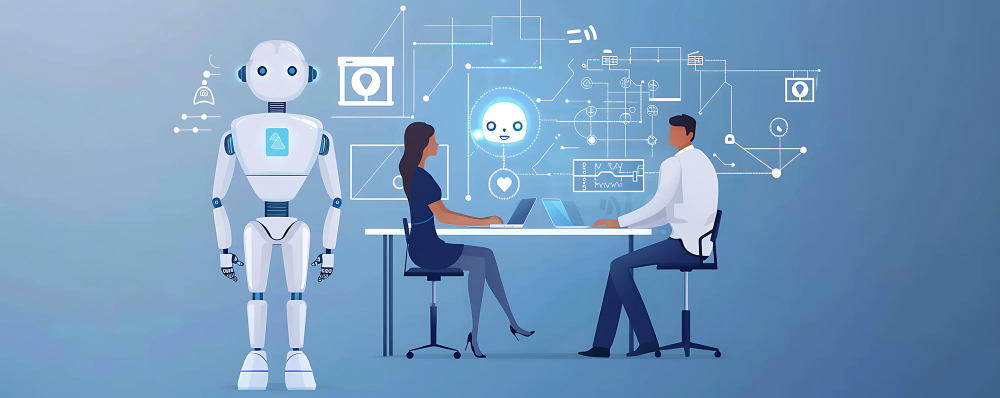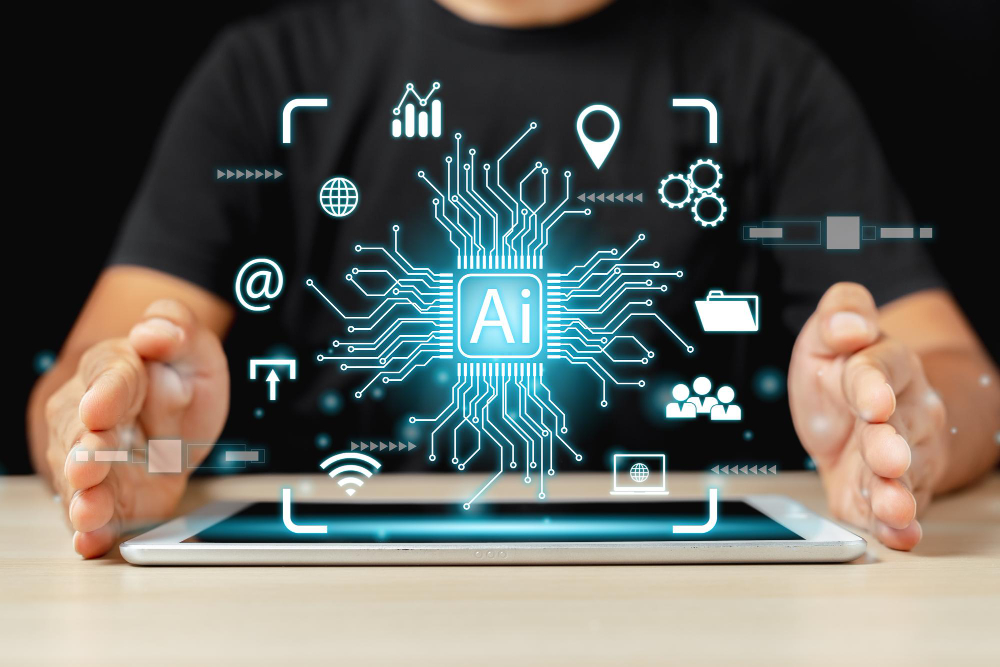The hiring process, traditionally reliant on human judgment and manual labor, is being transformed by AI technologies that promise greater efficiency, accuracy, and fairness. Organizations are enhancing talent acquisition by merging the creativity and experience of recruiters with the expansive capabilities of AI. According to a Guardian report from March 2023, one-third of businesses currently use AI in recruitment and a Mercer report in 2020 found that 55% of HR leaders were already using predictive algorithms in hiring. The reason behind this rapid adoption is that organizations are starting to see the potential of AI and what it can do to improve their recruitment efforts.
In this article, we will look at how AI and automation can enhance the talent acquisition process and discuss some of the benefits this technology can bring to businesses.
Understanding AI in Talent Acquisition
The role of AI in talent acquisition can be summarized in one word – efficiency. AI can improve the efficiency of multiple processes related to talent acquisition.
Here’s how AI is being utilized to reshape the way organizations attract, assess, and hire talent:
- Automated Resume Screening: One of the most time-consuming aspects of hiring is sifting through hundreds or thousands of resumes to find suitable candidates. AI can quickly analyze resumes, filtering out unqualified applicants and highlighting qualified applicants.
- Candidate Sourcing: AI for talent acquisition can identify potential candidates from a variety of sources. By analyzing data and patterns, AI can predict which candidates are likely to be a good fit for a role, even if they haven’t applied for a job directly.
- Chatbots and Virtual Assistants: AI-driven chatbots and virtual assistants can handle initial interactions with candidates, answer their questions, and provide information about the application process. These chatbots can also schedule interviews, send reminders, and provide feedback, making the hiring process more efficient.
- Predictive Analytics: AI can analyze historical hiring data and predict future trends, helping recruiters make more informed decisions. Predictive analytics can forecast which candidates are likely to succeed in a role based on their past performance and other relevant factors.
- Bias Reduction: Almost 50% of HR Managers admit to being affected by unconscious bias when selecting candidates. This can result not only in bad hires but can also be limiting for organizations that are trying to build a diverse workforce. When utilized correctly, AI for talent acquisition can counteract these biases and eliminate subjectivity in the hiring process.
- Employee Onboarding: AI can also play a role in the onboarding process by providing new hires with personalized training programs and resources. Virtual onboarding assistants can guide employees through their first day, helping them become productive more quickly.

Benefits of AI in Talent Acquisition
- Efficiency and Speed: The average recruiter spends up to 30 hours a week on administrative tasks such as sourcing candidates, screening resumes, scheduling interviews, and coordinating with other members of the hiring team. AI-based solutions can source through thousands of applications in an instant and identify qualified candidates.
- Improved Candidate Matching: Traditional methods often rely on keyword matching, which can overlook qualified candidates who may not use the exact keywords in their resumes. AI for talent acquisition goes beyond simple keyword searches, analyzing the context and relevance of skills and experiences, leading to a better job-candidate fit.
- Enhanced Candidate Experience: An inefficient recruitment process can significantly deter job applicants, with nearly 60% of candidates declining job offers due to poor recruitment experience. AI-enabled recruitment tools can help mitigate this problem by streamlining the entire application process and making it more efficient and enjoyable for candidates.
- Data-Driven Decisions: AI enables data-driven decision-making in talent acquisition by providing valuable insights from analytics. Recruiters can access detailed reports and metrics on various aspects of the hiring process. Predictive analytics can identify which recruitment strategies are most effective, helping companies allocate their resources wisely.
AI Tools and Technologies in Talent Acquisition
To fully leverage the benefits of AI in recruitment, organizations can utilize various AI tools and technologies designed to enhance different stages of the hiring process.
- Applicant Tracking Systems (ATS): ATS is integral to modern recruitment strategies. These systems automate the collection, organization, and analysis of candidate data, making it easier for recruiters to manage applications and track the progress of candidates.
- Chatbots and Virtual Assistants: AI-powered chatbots and virtual assistants are essential for initial candidate interactions and ongoing support. These tools handle routine inquiries, schedule interviews, and provide information about the recruitment process.
- Predictive Analytics Tools: Predictive analytics tools leverage AI to analyze historical data and predict future hiring outcomes. These tools can identify trends and patterns that indicate candidate success, helping recruiters make more informed decisions.
- AI-Based Assessment Tools: The tools evaluate candidates’ skills, personality traits, and cultural fit through various tests and simulations. These tools provide a more objective and comprehensive assessment of candidates.

The Future of AI in Talent Acquisition
The future of AI in recruitment is bright, with continuous innovations aimed at making the hiring process even more efficient and effective. According to the Society for Human Resources and Management, between 35% and 45% of companies are likely to adopt AI tools for talent acquisition this year alone.
Emerging technologies such as natural language processing (NLP) and advanced data analytics are set to play a crucial role. These innovations will enable more sophisticated candidate matching, predictive analytics for workforce planning, and enhanced candidate engagement through hyper-personalized communication.
As AI continues to evolve, the role of HR professionals is also set to evolve significantly with the integration of AI for talent acquisition. There will be an increasing demand for tech-savvy HR professionals who can effectively leverage AI tools. Additionally, roles related to AI maintenance, ethics, and data security will become more prevalent.
Final Thought
The integration of AI in recruitment is not just a trend; it is a necessary evolution that will shape the future of talent acquisition. The role of AI in talent acquisition promises to bring significant enhancements, making processes more efficient, accurate, and fair. As AI continues to reshape the recruitment landscape, HR professionals must embrace these technologies and seamlessly integrate them into their strategies.
G&S solutions and services offer businesses end-to-end solutions for their talent supply chain, from sourcing and screening to onboarding. With us, businesses can optimize their recruitment processes, reduce costs, and improve the quality of their hires.
Embrace the future of recruitment with G&S. Contact us today!
